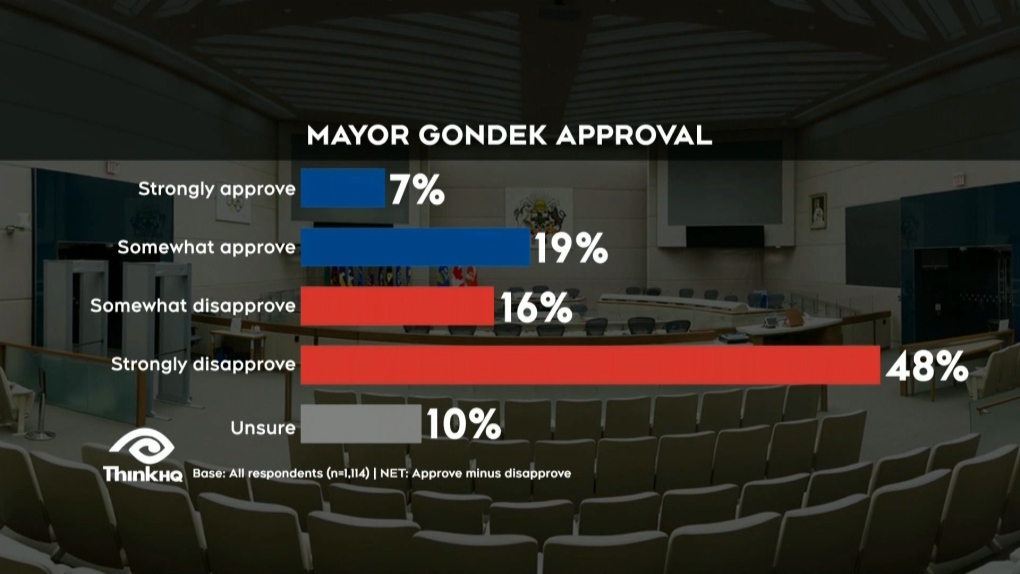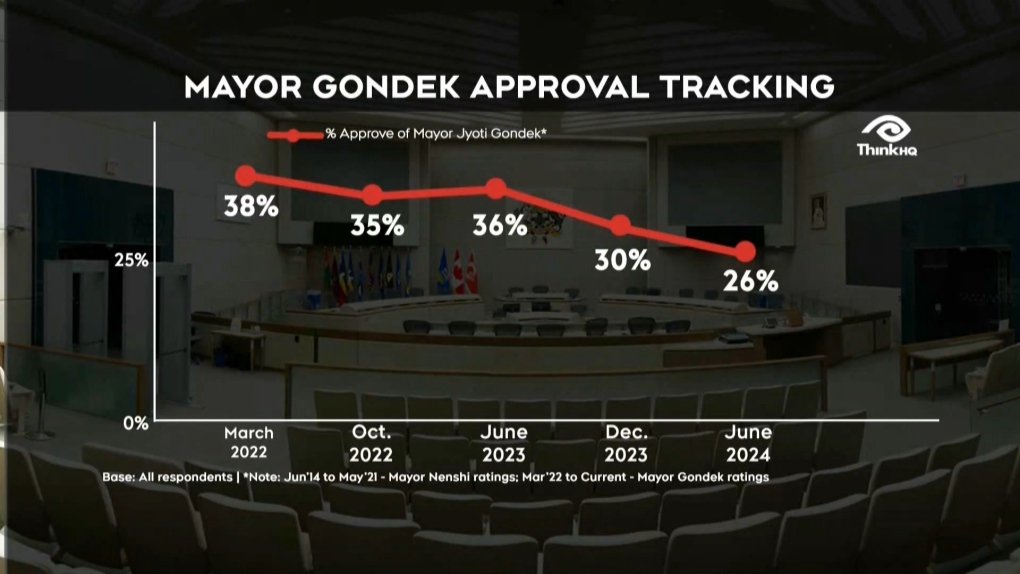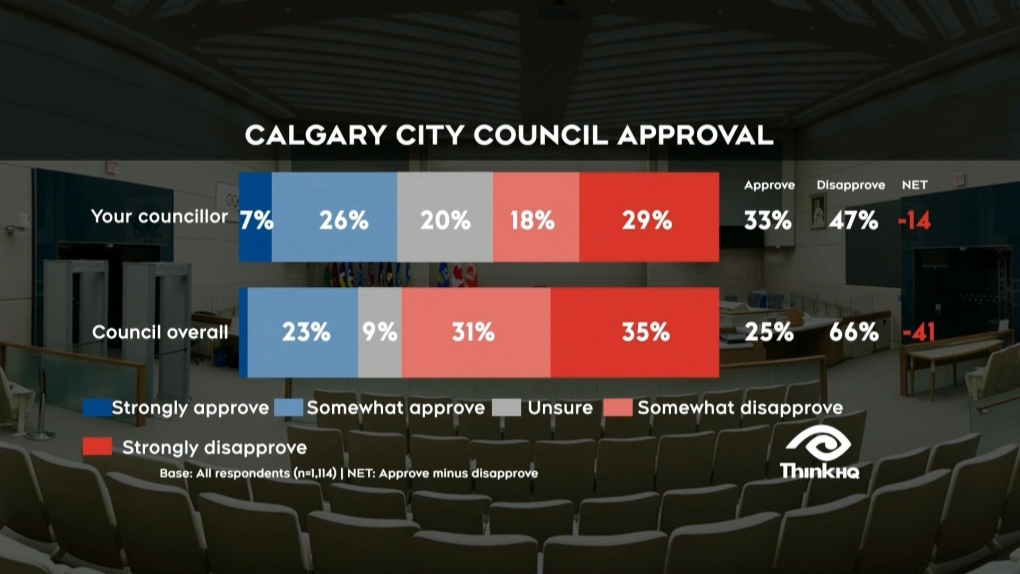Approval for Calgary's mayor and council sinks to all-time low amid water crisis
Public approval of Calgary's mayor and council has fallen beyond record lows recorded at the end of 2023, according to a new survey.
Between June 13 and 19, 2024, ThinkHQ conducted an online survey of 1,114 adults who live throughout Calgary and found approval for the mayor and councillors has hit an all-time low.
"For as long as there have been municipal polls in Calgary, this would be the low watermark. I think this is very much indicative of the mood in Calgary now," said Marc Henry, ThinkHQ president.
Mayor Jyoti Gondek has 26 per cent approval.
Almost half (48 per cent) of voters say they "strongly disapprove" of the mayor, compared to only seven per cent reporting "strong" approval.


Overall, city councillors also received increasingly negative ratings, with 33 per cent saying they approve of their councillor.
"They haven't paid attention to the basic services in Calgary and so I'm not impressed with them," said Calgarian Gord Mayor, who added he was also disappointed with the decision to pass the rezoning bylaw.
Calgarian Arti Dutt said she was also disappointed with the mayor and council.
"I haven't seen anything significant happening, any significant changes," she said.

ThinkHQ invited a sample, chosen at random, to reflect gender, age and region of the Calgary population, according to Stats Canada.
The margin of error for a comparable probability-based random sample of this size is +/- 2.9 percentage points, 19 times out of 20.
Demographics
Men tend to offer harsher ratings of the mayor than women, and younger people tend to be less critical, with those 55 or over and those in the highest household income bracket giving the most negative assessments of the mayor.
Disapproval for the mayor is less concentrated in the inner city.
Councillor performance ratings are fairly consistent across demographics.
Men tend to be more negative about their councillors than women and residents in new and suburban communities provided fewer negative ratings of their councillors.
Times of crisis
A water crisis of a different kind 11 years ago had a different impact.
In 2013, mayor Naheed Nenshi's approval rating rose significantly during the floods.
"There is a tendency in times of crisis for people to rally around a leader. Gondek's not seeing any of that sort of bump and I suspect it has to do more with the nature of the problem," Henry said.
The flood was a natural disaster.
The water supply crisis is due to infrastructure.
The mayor says this is also a turbulent time for Calgarians.
"Costs have gone up considerably. Inflation continues to rise. We have got more people moving to our city than we have ever seen before or predicted. And with that comes an affordability crunch," Gondek said.
"We understand that is difficult for everyone. We are trying to do the best we can to address those difficulties. We are trying to partner with other orders of government to ensure they realize we can't do this alone."
Calgary's next municipal election is set to take place on Oct. 20, 2025.
"If these numbers hold, I think the mayor would have a very difficult time being re-elected if she chose to run," Henry said.
CTVNews.ca Top Stories

Former Liberal cabinet minister Marco Mendicino won't seek re-election
Marco Mendicino, a prominent Toronto member of Parliament and former minister of public safety and immigration, won't run in the next federal election, CTV News has learned.
Pickering pausing in-person meeting due to alt-right threats, mayor says
Pickering Mayor Kevin Ashe says the city is pausing all in-person meetings, moving them to a virtual format, for the time being due to “alt-right” threats.
Athabasca 'chop shop' bust yields millions in stolen vehicles, heavy equipment: RCMP
RCMP have made what they call a "major recovery" of stolen property in Athabasca.
2 dead and 18 injured in Southern California plane crash
Two people died and 18 were injured Thursday when a small plane crashed through the roof of a sprawling furniture manufacturing building in Southern California where at least 200 people were working, police said.
Toys "R" Us Canada closing 5 stores, expand HMV and add play spaces to some shops
Toys 'R' Us Canada says it is closing five Ontario stores and revamping several others as it works to 'optimize' its business.
Wayne Osmond, singer and guitarist for The Osmonds, is dead at 73
Wayne Osmond, a singer, guitarist and founding member of the million-selling family act The Osmonds, who were known for such 1970s teen hits as 'One Bad Apple,' 'Yo-Yo' and 'Down By the Lazy River,' has died. He was 73.
Grieving orca mother Tahlequah carries dead baby for the second time
The famous mother orca who made waves around the world for carrying her dead calf for 17 days has suffered another tragic loss.
U.S. soldier shot self in head before Cybertruck exploded outside Trump's Las Vegas hotel, officials say
The highly decorated U.S. army soldier inside a Tesla Cybertruck packed with fireworks that exploded outside Trump International Hotel in Las Vegas shot himself in the head just before detonation, authorities said Thursday.
'Premeditated and an evil act': FBI updates on investigation into New Orleans 'act of terrorism'
The FBI now says that the pickup truck driver responsible for a deadly rampage in New Orleans acted alone.

































